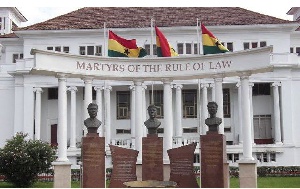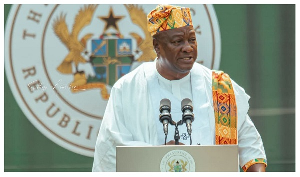This article seeks to examine the effect of the disclosure regime articulated by the Supreme Court of Ghana in the case of Rep v Eugene Baffoe-Bonnie & others (herein referred to as Baffoe-Bonnie’s case) unreported on Administrative tribunal (proceedings) as quasi judicial body.
In this article, reference will also be made to the disciplinary proceedings and related matters” under Police Service Regulations, 2012 (C.I.76) in relation to the disclosure regime.
The Supreme Court in Baffoe-Bonnie’s case held that in criminal proceedings irrespective of the mode of trial an accused person is entitled to be given or have access to copies of witnesses’ statements, copies of documents and exhibits in the possession of the prosecution, including materials they do not intend to tender before a trial court.
Ordinarily, in civil proceedings, there are rules for disclosure of documents and discoveries. The objective of those rules is, at least in part, to ensure that each party is fully aware of all evidence about the case and also to avoid trial by ambush. In criminal law, public policy dictates that an accused person has a right to all information in the possession of the prosecution. In the Baffoe-Bonnie’s case, the Supreme Court made clear the extent of the disclosure required in criminal trial irrespective of the mode of trial though subject to inter alia the existence of legal privilege. These information includes the fruits of the investigation whether favourable or not to the prosecution’s case.
In administrative proceedings, the rules of natural justice and procedural fairness have long required a certain level of disclosure. The Baffoe-Bonnie’s case and the practice direction (Disclosures and case management in criminal proceedings) by the Chief Justice has however, triggered the need for the Court to develop disclosure standards for administrative proceedings that look a lot like the disclosure standards outlined in Baffoe-Bonnie’s case. In my quest to examine the effect of the disclosure regime on administrative tribunal (proceedings), it is worth addressing the issues below:
1. Whether the principle of disclosure as enunciated by the Supreme Court in Baffoe-Bonnie’s case is applicable to administrative tribunals (proceedings)?
2. If yes, to what extent and/or standard of disclosure is required?
To start with the analysis, there is an embedded question to be considered in the first issue, and that is; what is the duty of disclosure? In other words, what is the effect of disclosure and non-disclosure? The cardinal purpose of disclosure is to secure fair trial, equality of arms and also to ensure that justice is done irrespective of the mode trail. Non-disclosure of material information may prejudice the fairness of a trial. And again non-disclosure will be incompatible with article 19 rights of the accused/defendant under the Constitution, 1992. The only purpose of non-disclosure in administrative proceedings in my opinion may be to serve as weapon in the arsenal of the prosecution.
Therefore, the first issue is answered in affirmative. A measure of the relevance of material information is its usefulness to the defence. If, it is of some use, it is relevant and should be disclosed. Accordingly, material information is relevant if it can reasonably and/or probably be used by the defence either in meeting the case for the prosecution, advancing a defence or otherwise in making a decision which may affect the conduct of the defence such as, for example, whether to call a witness.
Furthermore, the principle of disclosure as enunciated by the Supreme Court in Baffoe-Bonnie’s case must certainly be applicable to administrative tribunals (proceedings). Thus, there is a duty on the prosecutor to disclose material information to the defendant to enable him knows the case to be met. Professional organization, such as Ghana Police Service, Immigration Service and other sister agencies fulfill germane public functions in the regulation of their professions and should not be viewed as adversaries engaging in a form of civil litigation. Like a criminal prosecution, the purpose of disciplinary proceedings should not be to obtain a conviction, instead to present all relevant information to the disciplinary committee or panel (prosecution) to determine whether professional misconduct has occurred.
A finding of professional misconduct can have grave and permanent consequences on the affected person or persons. In some cases, the consequences may be severe than a criminal conviction. Therefore, the policy reasons for full disclosure of all material information should apply to administrative proceedings (disciplinary proceedings) to ensure equality of arms.
Again, it will be prudent to apply the principle in Baffoe-Bonnie’s case to professional disciplinary proceedings, such as disciplinary proceedings under the Police Service Regulations, 2012; (C.I.76) will require that the prosecution (disciplinary authority) disclose all material information to the defendant to enable the defendant to prepare his defence prior to the commencement of proceedings. The effect of the principle inter alia is to guarantee fair trial and equality of arms, which require that the parties to a proceeding are treated without any discrimination and/or distinction based on the nature or mode of the trial.
Admittedly, justice in administrative proceedings such as Service Enquiry (formal proceedings) under the C.I.76 would be better served if the element of surprise is eliminated from the proceedings and the parties are prepare to address issues on the basis of disclosure of material information of the case to be met. Thus, it will not take a quantum leap to come to the conclusion that justice will be better served when there is equality of arms.
Flowing from above, the second issue is partly resolved. The extent and/or standard of disclosure require by administrative tribunal (proceedings) goes to the root of procedural fairness and this raises, however, a central difficulty with the analysis of procedural fairness in administrative law. Undoubtedly, administrative decision-makers are required to be fair. It is also accepted, that it is not, in most cases, necessary for administrative decision-makers to adopt the full trappings of the Court. However, the standard of disclosure for a disciplinary tribunal was described by the Supreme Court of Canada as follows:
The importance of full disclosure to the fairness of the disciplinary proceedings before the Board cannot be overstated. Although the standards of pre-trial disclosure in criminal matters would generally be higher than in administrative matters (see Biscotti et al. v Ontario Securities), tribunals should disclose all information relevant to the conduct of the case, whether it may be damaging to and/or supportive of a Respondent’s position, in a timely manner unless it is privileged as a matter of law. Minimally, this should include copies of all witness statements and notes of investigators. . . . The absence of a request for disclosure or otherwise, is of no significance. The obligation to make disclosure is a continuing one. The Board has a positive obligation to ensure the fairness of its own processes. The failure to make proper disclosure will impacts significantly on the appearances of justice and the fairness of the hearing itself..
Again, in Hammami v. College of Physicians and Surgeons of British Columbia [1997] B.C.J. No. 1702, the Supreme Court of the British Columbia was invited to consider whether the principles of disclosure as articulated by the Supreme Court of Canada in R v, Stinchcombe [1991] 3SCR 326 apply to administrative tribunals. After canvassing various decisions which considered the application of Stinchcombe case in administrative settings, the Chief Justice Bryan Williams wrote:
It is seems to me the following principles can be gleaned from the above cases:
1. The Stinchcombe itself arose in the criminal context and held that full disclosure must be made in indictable offences, and that it may be applicable in other offences as well.
2. That in cases arising from the administrative law context where the decision of an administrative tribunal might terminate or restrict the “accused’s” right to practice or pursue that career or seriously impact on a professional reputation then the principles in Stinchcombe, in respect of disclosure may well apply….(though all of persuasive effect)
Consequently, if the effect of the principle of disclosure, in Baffoe-Bonnie’s case, inter alia is to secure fair trial and equality of arms, which require that the parties to a proceeding are treated without any discrimination and/or distinction based on the nature or mode of the trial. Then the standard according to Baffoe-Bonnie’s case is applicable to administrative proceedings when the right to continue in one’s profession or employment is at stake. Furthermore, the likelihood that the decision of an administrative proceedings such Service Enquiry (formal proceedings) under Police Service Regulations, 2012 (C.I.76) will affect the right, privileges or interest of the defendant is sufficient to trigger the application of the standard of disclosure in Baffoe-Bonnie’s case. To buttress this point, regulation 85(1)(a) of C.I. 76 is to the effect that; For the purposes of this regulations, dismissal, termination and reduction in rank are penalties for major offences. Obviously, the consequences of regulation 85(1)(a) may be severe than a criminal conviction, example is a criminal conviction of caution and discharge or a fine of twenty (20) penalty unit. Therefore, the policy reasons for full disclosure of all material information should apply to administrative proceedings such as Service Enquiry (formal proceedings) under the C.I.76 to secure fair trial and to ensure equality of arms. The subsequent paragraphs will further stress the need for full disclosure of all material information in administrative proceedings such as Service Enquiry (formal proceedings) under the C.I.76.
Disciplinary proceedings under the C.I.76 with regards to the Disclosure regime
I agreed with the jurisprudence that the quality of justice and fairness of the hearing one gets should not be depended and/or restricted to the mode of trial. Article 23 of the Constitution imposes obligations on administrative bodies and administrative officials to act fairly, reasonably and to comply with the requirement of the law imposed on them. These obligations which the Constitution imposes on administrative bodies and officials are intended to ensure that there is administrative justice. In Awuni v. West Africa Examination Council [2003-2004] SCGLR 471, the Supreme Court held that the obligation imposed on administrative bodies to act fairly and reasonably requires observance of the rules of natural justice. In the words of Kpegah JSC;
“……… I cannot contemplate how a person could be said to have acted fairly and reasonably if he did not give either notice….
That NOTICE as used above is a legal concept describing a requirement that a party be aware of a legal process within a reasonable time, which has the potential of affecting his rights, interest, reputation, etc.
Article19 (2) (e) of the Constitution, 1992 when paraphrased reads:
“a person charged with a criminal offence shall be given adequate time and facilities to prepare his defence...
This provision of the Constitution has been adopted as a right of a defendant under regulation 97(2) of Police Service Regulations, 2012 (C.I. 76).
It is germane for purposes of clarity to set out regulation 97(2) of Police Service Regulations, 2012 (C.I. 76):
(2) A defendant shall be given adequate time and facilities for the preparation of a defence.
The Supreme Court in Baffoe-Bonnie’s case construed the phrase ‘adequate facilities’ under article19 (2) (e) of the Constitution, 1992 which is adopted by regulation 97(2) of Police Service Regulations, 2012 (C.I. 76) to mean the duty of the prosecution to disclose to the accused materials in his possession to enable the accused prepare his defence, examination of any witnesses called by the prosecution and securing witnesses to testify on his behalf.
Additionally, according to the Court the accused should not be denied something the result of which denial will hamper his defence as it is one of the principles of fundamental justice to ensure that the innocent are not convicted. Again, in the wisdom of the Supreme Court the phrase ‘adequate time’ is a question of fact. In the words of the Supreme Court;
“adequate time” depends on the circumstances of each case such as the complexity of the case.
It is my submission that the effect of the principle of disclosure in Baffoe-Bonnie’s case inter alia is to secure fair trial and equality of arms be apply to administrative tribunals. And the same Court gave the meaning of the phrase ‘fair trial’ in words of the Supreme Court;
“…. we hold that to give meaning to this right to a fair trial, the accused person ……. is entitled to be given or have access to copies of witnesses’ statements, copies of documents and exhibits in the possession of the prosecution, including materials they do not intend to tender before a trial court.”
Thus, disciplinary proceedings such Service Enquiry under C.I.76 must give effect to the principle of disclosure in Baffoe-Bonnie’s case. The disciplinary authority and/or the officer holding the enquiry cannot purport to give different interpretation and/or effect to regulation 97(2) of Police Service Regulations, 2012 (C.I. 76) other than the pronouncement by the Supreme Court in Baffoe-Bonnie’s case (supra). This is so because the provision of article 19(2)(e) of the Constitution has been adopted by regulation 97(2) of C.I. 76 as a right of defendant and for that matter the provision of regulation 97(2) of C.I. 76 cannot be subjected to a different interpretation other than the construction by the Supreme Court in Baffoe-Bonnie’s case (supra). It is trite that in cases where the language of an enactment is so clear and unambiguous, the fundamental rule is that effect must be given to it. The disciplinary authority or prosecution may only subject the phrase ‘adequate facilities’ to a different interpretation when the word and/or phrase is imprecise, unclear or ambiguous. However, under the circumstances, there is no ambiguity because the phrase ‘adequate facilities’ have received pronouncement by the apex Court of the land, ie the Supreme Court in Baffoe-Bonnie’s case. An attempt by any administrative tribunal or proceedings intended to give different interpretation and/or effect to the phrase ‘adequate facilities’ may incur the wrath or displeasure of the High Court under judicial review.
Justification for disclosure of material information by administrative tribunal
The justification for disclosure by administrative tribunals such as disciplinary authority or prosecution under Police Service Regulations, 2012 (C.I.76), subject to legal privilege and other exclusionary circumstances in law may include:
1. To secure fair trial, equality of arms and also to ensure that justice is done.
2. To resolve non-contentious and time consuming issues in advance of trial in an effort to ensure a more efficient use of the tribunal’s time and avoid unnecessary proceedings
3. To encourage the resolution of cases including, where appropriate, the entering of guilty pleas or the withdrawal of charges at an early stage of the proceedings.
4. That if the decision of administrative proceedings has the potential to affect the legal rights or fundamental interests of the defendant.
5. Where the decision of administrative tribunal might terminate, restrict the defendant right to practice or pursue a career or seriously impact on his professional reputation.
6. The role of the disciplinary authority is analogous to the prosecution in criminal proceedings and the purpose of the prosecution is not to secure conviction but bring to the trier of fact the credible evidence relevant to the proceedings.
7. Again, the fruits of the investigations which led to the proceedings and are in possession of the disciplinary authority or prosecution are not the property of the disciplinary authority for use in securing conviction, but the property of the public to be use to ensure that justice is done.
8. The obligation of the disciplinary authority or prosecution under Police Regulations, 2012 (C.I.76) is to bring forward all material information to the notice of the defendant, rather than to obtain a conviction.
What must be disclosed
As soon as practicable upon request or not, the disciplinary authority or prosecution will make available to the defence material information whether inculpatory or exculpatory which include the following:
1. A copy of or an opportunity to copy of the charge sheet.
2. A copy of or an opportunity to copy, the investigative report, example ‘PIPS’ report.
3. copies of, or an opportunity to copy, of witnesses’ statements,
4. copies of or an opportunity to copies of documents and exhibits in the possession of the prosecution, including materials they do not intend to tender before the tribunal
CONCLUSION
1. In conclusion therefore, I advocate that where inter alia the decision of administrative tribunals might terminate, restrict the defendant right to practice or pursue a career or seriously impact on his professional reputation, disciplinary authority or the prosecution must ensure that the principle of disclosure in Baffoe-Bonnie’s case is adhere to by disclosing all material information in order to secure fair trial, equality of arms and also to ensure that justice done. However, under the Police Service Regulation, 2012 there is no such discretion to do contrary. It is mandatory to disclose material information to the defendant with the adoption of the constitutional (supra). A deviation of the above principles will be tantamount to rule of man instead of LAW.
Opinions of Thursday, 31 January 2019
Columnist: Sylvester Asare



















